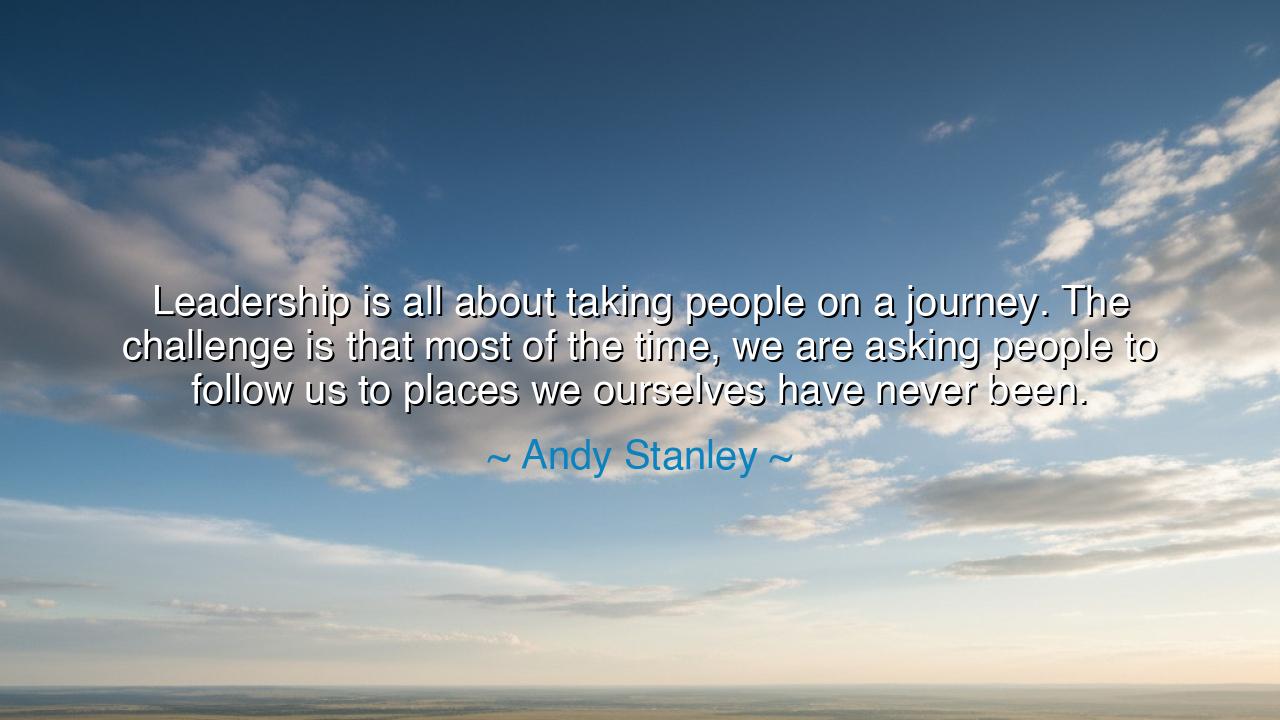
Leadership is all about taking people on a journey. The challenge
Leadership is all about taking people on a journey. The challenge is that most of the time, we are asking people to follow us to places we ourselves have never been.






The words of Andy Stanley ring like the voice of an oracle: “Leadership is all about taking people on a journey. The challenge is that most of the time, we are asking people to follow us to places we ourselves have never been.” In these words lies both the glory and the burden of guiding others. For what is leadership if not the call to walk into the unknown, to tread upon paths unmarked by footsteps, and to carry others into the realm of possibility? The ancients knew this truth well, for no great leader walked only where certainty already dwelled; instead, they stepped into the darkness, bearing light for those who trusted them.
The heart of this teaching is clear: to lead is not merely to command, but to journey. A leader does not stand still while others move. A leader is one who dares to face uncertainty first, yet paradoxically, must admit that he too does not know the end of the road. This is the paradox of vision—it shines brightly ahead, yet is always shrouded in mystery until one reaches it. To invite others to follow is to ask them to surrender their comfort and step into a realm unseen, driven only by trust, courage, and faith.
Consider the tale of Moses, who led his people out of Egypt. He was not shown every detail of the Promised Land. He had no map of every river, mountain, and plain. And yet he lifted his staff, crossed seas, wandered deserts, and asked thousands to walk with him toward a destiny unseen. Many doubted. Some complained. Others longed to return to the chains of Egypt, for slavery seemed easier than uncertainty. Yet the leader’s role is not to offer the certainty of the known, but the hope of the unseen. So Moses pressed forward, embodying the very essence of Stanley’s teaching: leading people to a place he himself had never been.
This truth resounds in more recent times as well. Think of the explorers who sought new lands, or the pioneers who crossed the American frontier. When Lewis and Clark embarked on their expedition, they ventured into a wilderness uncharted by their nation. They could not promise their men what lay ahead—whether abundance or starvation, safety or death. Yet their courage carried them, and because they led, a whole nation’s borders expanded, and new possibilities opened. Such is the nature of leadership: to stride into the unknown and beckon others to trust in the vision of what might be.
But let us not mistake this for recklessness. To lead others to places unseen requires deep humility. The wise leader admits, “I do not know all things, but I will go before you, and with you, and together we will learn the way.” It is not the arrogance of certainty, but the faith of courage, that wins the hearts of followers. Those who would be great leaders must embrace vulnerability, acknowledging the risks yet daring to walk anyway. For in truth, the greatness of a leader is not in knowing every step, but in summoning the courage to take the first.
Therefore, the lesson is this: if you would be a leader, do not wait until you hold the map of every turn. You will never possess it. Instead, cultivate vision, courage, and trust. Let vision be the fire that kindles direction, courage the shield that faces fear, and trust the bond that unites followers to leader. Without these, journeys falter; with them, even the impossible becomes possible.
In your own life, you may not guide nations or part seas, but you too are called to lead—your family, your companions, your community, or perhaps even your own heart. Ask yourself: where must I go that I have not yet gone? Whom must I invite to walk beside me? Begin with small acts—invite others to learn with you, take risks together, and pursue dreams that neither of you has yet tasted. Let your words be honest, your courage steadfast, and your vision unwavering.
Thus, remember: leadership is a journey into the unknown, not a march upon familiar roads. To lead is to take the first step where none have trod, to carry others into lands uncharted, and to believe that the light of tomorrow shines brighter than the shadows of today. Go, then, and be bold. For the world is waiting for those who dare to walk where no path has yet been made.






AAdministratorAdministrator
Welcome, honored guests. Please leave a comment, we will respond soon